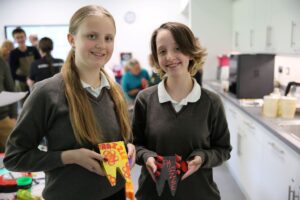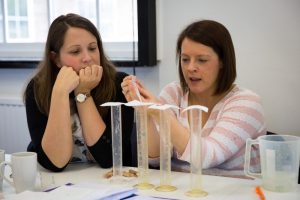Experiment with Outdoor Science
Wednesday 24th June 2020
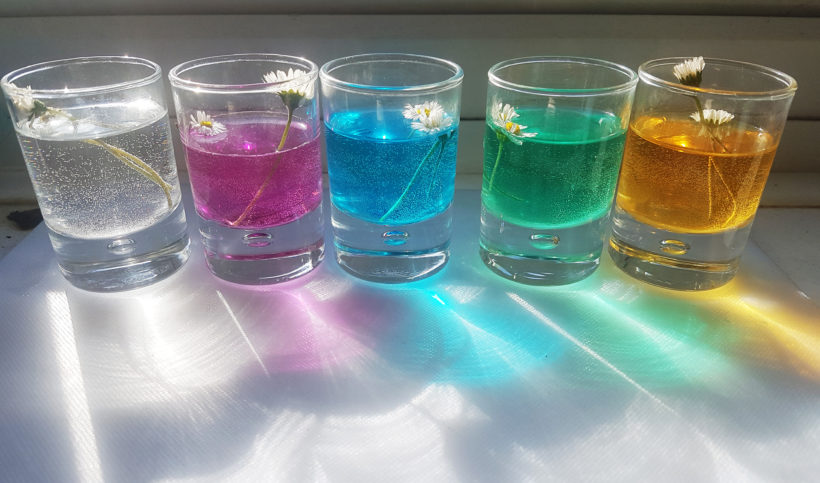
Want to take part in our Big Science Event at home this summer? Are you looking for outdoor projects that you can do with all the family? It’s the perfect time of year to get out and about. Science Oxford’s Education Programme Officer, Ian Snell has some great ideas for budding scientists to explore the amazing outdoor world right on your doorstep…..
In the garden…
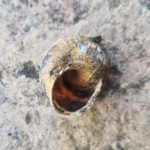 Ian has a small garden and let’s just say it’s been “re-wilded” making it a haven for wildlife. Mind you, that in itself could make some excellent questions for the Big Science Event at home – for example, how many different types of bird, or bee, visit your garden? Do bees always visit the same flowers? Do bees prefer to visit flowers at a particular time of day?
Ian has a small garden and let’s just say it’s been “re-wilded” making it a haven for wildlife. Mind you, that in itself could make some excellent questions for the Big Science Event at home – for example, how many different types of bird, or bee, visit your garden? Do bees always visit the same flowers? Do bees prefer to visit flowers at a particular time of day?
On thing he spotted was an abandoned snail shell which reminded him of an excellent investigation from a previous Big Science Event – are bigger snails faster than smaller ones? If you wait for a rainy day, you might be able to find some different sized snails and set up a race. Remember to be kind to the snails and put them back where you found them!
Along the road…
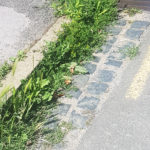 As there was not much more exploration to be done in Ian’s garden, he went for a walk to explore his neighbourhood… As he walked down the road, he noticed how green the road was and wondered how many different plants he might find walking along the pavement – already, another possible question for the Big Science Event!
As there was not much more exploration to be done in Ian’s garden, he went for a walk to explore his neighbourhood… As he walked down the road, he noticed how green the road was and wondered how many different plants he might find walking along the pavement – already, another possible question for the Big Science Event!
The trees across the road got him thinking about previous Big Science Event questions – where do seeds grow best? Do they like sunny or shady areas? If you have a garden or even a windowsill, you could try something like this. Or, by studying the leaves, you work out how many different types of tree are there within 5 minutes’ walk of your house?
The traffic lights further down the road made Ian wonder whether it always take the same amount of time for the lights to change? Does this change at different times of the day? The lights are probably controlled by a computer, but maybe they change quicker when the traffic is busier?
In the park….
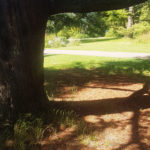 In his local park Ian saw some children playing on the swings and thought that could be an excellent piece of equipment for an investigation… Do bigger children swing faster than smaller children? Can you swing higher if you move your feet? And the nearby tennis courts brought up another series of questions: what factors affect a ball’s bounce height? In fact, bouncing balls can lead to some very good investigations using fair testing – for example, how many times do different balls bounce?
In his local park Ian saw some children playing on the swings and thought that could be an excellent piece of equipment for an investigation… Do bigger children swing faster than smaller children? Can you swing higher if you move your feet? And the nearby tennis courts brought up another series of questions: what factors affect a ball’s bounce height? In fact, bouncing balls can lead to some very good investigations using fair testing – for example, how many times do different balls bounce?
Sitting in the shade of a nearby tree, Ian realised the shadows the trees were making were really quite pretty and he asked himself how do shadows change during the day? And how does the sun move through the day? Interesting questions to investigate!
The park was lovely, but unfortunately, some people had been a little careless and dropped some rubbish. One year, Bledlow Ridge School investigated what litter is dropped and where in the village centre? You could do a similar survey in your local park.
On your window sill…
 Ian picked a few daisies and when he got home put them in some water. Would coloured water make any difference? You could experiment with celery instead of daisies but make sure you have a full stalk with leaves. You’ll be surprised at the results.
Ian picked a few daisies and when he got home put them in some water. Would coloured water make any difference? You could experiment with celery instead of daisies but make sure you have a full stalk with leaves. You’ll be surprised at the results.
There are lots of things you can investigate outside and hopefully Ian has given you some ideas. Look around and find something that makes you ask a question. Be sure to stay safe.
We look forward to seeing the results of your outdoor experiments – send your investigation to Ian as a short video, poster or photo diary by 13th July. To find out more about the Big Science Event at Home and how to enter, see here: scienceoxford.com/bigscienceeventathome.
There are loads of great prizes – you could win £500-worth of outdoor play equipment for your school, home science kits from the Curiosity Box and family visits to the Science Oxford Centre when we re-open. Good luck!
 Ian Snell,
Ian Snell,
Science Oxford’s Education Programme Officer

